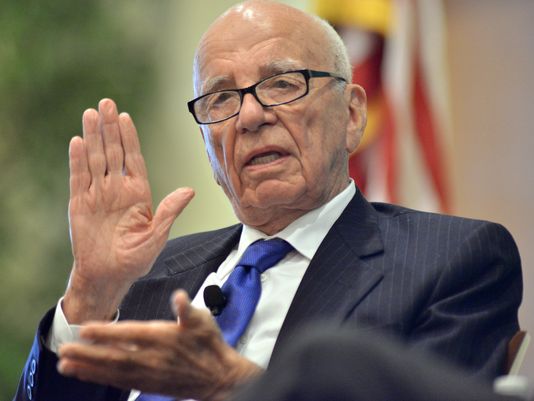Murdoch goes large as media landscape gets tougher
HTTP/1.1 200 OK Server: nginx/1.2.7 Content-Type: text/html; charset=utf-8 Content-Language: en Last-Modified: Thu, 17 Jul 2014 04:27:17 GMT X-UA-Compatible: IE=Edge,chrome=1 X-Secret: cnpudnkgcnpiZXZnbUBoZm5nYnFubC5wYnogbmFxIFYganZ5eSBnZWwgZ2IgdHJnIGxiaCBuIHdiby4= Cache-Control: max-age=20 Expires: Thu, 17 Jul 2014 04:29:03 GMT Date: Thu, 17 Jul 2014 04:28:43 GMT Transfer-Encoding: chunked Connection: keep-alive Connection: Transfer-Encoding
SAN FRANCISCO -- Rupert Murdoch's audacious $80 billion bid to add Time Warner's media properties to his Fox empire provides a glimpse into the future of the news and entertainment industry.
It's looking like one where huge content owners such as Murdoch will vie for power and profit against massively-large distributors such as cable giant Comcast -- with little oversight from Washington, D.C.
The landscape of the decades-old struggle between content and distribution has shifted markedly in favor of Comcast and its rivals since January, when a federal court tossed aside Net Neutrality rules.
With Comcast, Cox, AT&T and Verizon now free to charge market rates for delivering digital entertainment into consumers' homes, the carving up of the growing online media pie will be a red-meat feast.
As low-cost Internet shows increase competition -- even as traditional entertainment production costs climb from New York to Hollywood -- Murdoch knows that future distribution negotiations in a less-regulated market will require an even stronger hand.
If anything, it's perhaps surprising that Murdoch didn't act even faster in courting Time Warner and its decades-long expertise in producing movies, news and TV shows.
Comcast CEO Brian Roberts wasted far less time in making his $45 billion bid for Time Warner Cable, a deal that if approved by the FCC will create a dominant cable company in the U.S.
Roberts pounced soon after the January appeals court ruling made clear that a fully-deregulated telecom market would set future distribution prices with little meddling from regulators.
That ruling strengthened Comcast's hand in negotiations with online content companies such as Netflix, Amazon.com and Google's YouTube.
That's why they've started signing new network peering arrangements with the cable giant.
The same will be true of future negotiations that Comcast, AT&T and Verizon have with the traditional TV networks, cable channels and entertainment producers such as Murdoch's Fox properties and Time Warner.
Even as the regulatory pendulum has swung in favor of the distributors, the NFL and other sports leagues are demanding higher fees to show their games.
Pressured by both sides of the media value chain, Murdoch is trying to bulk up.
Whether he can do so quickly with a Time Warner acquisition will depend on how much he's willing to pay its shareholders.
The Time Warner board, in rejecting his initial offer, has said that $80 billion isn't enough.
And those investors who bid the company's shares up as much as 18% on Wednesday agree.
The success of Murdoch's gambit may also depend on whether the FCC – which would have to approve any deal -- decides that the best way to protect online media consumers from a massive distributor is to have an equally-powerful content owner in the U.S. market.
John Shinal has covered tech and financial markets for more than 15 years at Bloomberg, BusinessWeek,The San Francisco Chronicle, Dow Jones MarketWatch, Wall Street Journal Digital Network and others. Follow him on Twitter: @johnshinal.
Read or Share this story: http://usat.ly/1mimNyS










